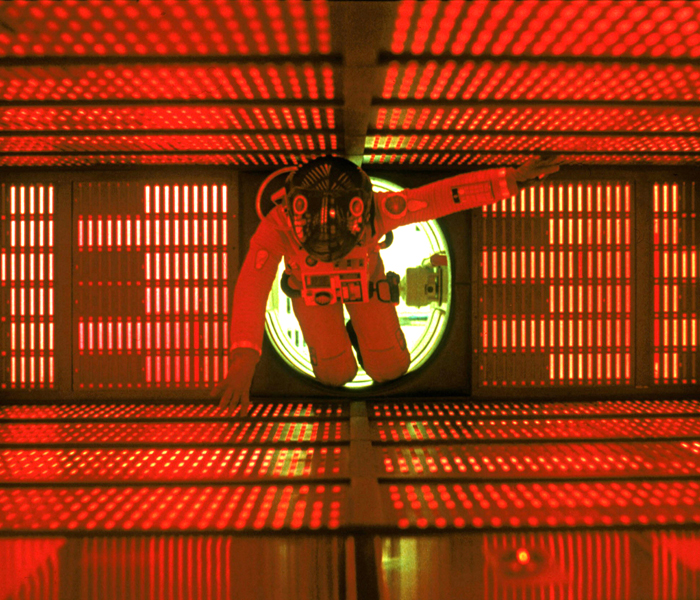2001: A Space Odyssey (Stanley Kubrick, 1968): UK/USA
Reviewed by Byron Potau. Viewed at The Egyptian Theatre in Los Angeles as part of the 2010 TCM Classic Film Festival.

Due to various releases in different formats with different features I am the proud owner of four different copies of Stanley Kubrick’s science fiction masterpiece, 2001: A Space Odyssey; one on VHS, two on DVD, and one on Blu Ray. Going to see it on the big screen may seem like overkill, if it doesn’t already, but when you have the chance to see one of the five greatest films ever made on the big screen you go. With its painstaking realism, philosophical ambiguity and far reaching ambition it single handedly changed science fiction forever.
After the “Dawn of Man” sequence, in which the origins of man’s/ape’s first step toward intelligence is shown to somehow be connected with a black monolith, we are transported forward millions of years to the year 2001 where man’s intelligence has brought him to inhabit outer space and travel freely from the Earth to the Moon where they have established various colonies. A black monolith has been discovered on the Moon, sending out a strong radio emission toward Jupiter. Eighteen months later a crew is formed and a mission sent out to discover its purpose. Most of the crew is already in hibernation leaving Doctors David Bowman (Keir Dullea) and Frank Poole (Gary Lockwood) to inhabit the ship with the ship’s lifelike, and presumably infallible, artificially intelligent computer HAL (voiced by Douglas Rain). Things begin to go terribly wrong when it appears all is not right with HAL.
Science fiction was never the same after this film and Kubrick went to great lengths to achieve its realism, employing several technical advisors to accurately depict what conditions would be like. The result is, perhaps, the most accurate science fiction film in all of cinema. Though some may find it boring, its emphasis on the details of reality, everything from the slow synchronization of the docking ship to its floating landing platform, to instructions on a zero gravity toilet, are painstaking and fascinating in anticipating the details of space travel.
Kubrick shows a brilliant eye toward our own future with the space station full of corporate sponsors; Hilton Space Station, IBM computers in the space ships, and Howard Johnson’s lounge. There are also other little imaginative creations that mirror our present society and even things which are on our society’s horizon.
The human characters are intentionally toned down in their emotions while the ship’s computer HAL shows the greatest range of emotions, emphasizing one of the film’s main themes of man versus technology. Douglas Rain, in one cinema’s most famous and brilliant voice characterizations, makes HAL the film’s most fascinating character. His speech, trapped in the mechanics of a computer, yearns to be human.
The film is brimming with unforgettable sequences from the Dawn of Man to the stargate sequence. Though the film’s dialogue is sparse there are several memorable lines many of which are spoken by HAL. These scenes have found their way into popular culture through several homages and parodies. It is hard to imagine that anyone has not seen this film or is not at least familiar with what happens. However, I won’t say too much in the off chance I could ruin it for somebody.
The marriage of music and image has rarely been better than it is here. So brilliant is it that it is hard to listen to Johann Strauss’s The Blue Danube without thinking of the elegant movements in zero gravity outer space. Likewise, Richard Strauss’s Thus Spoke Zarathustra is used so fittingly that it can only be used again to parody Kubrick’s use of it.
When it came to special effects Kubrick was essentially inventing everything his film would do. There was hardly any precedent as he and Douglas Trumbull were able to convince us we were really out in space through its beauty and its dangers. The stargate sequence remains visually impressive as do the film’s many other techniques. The special effects accounted for the film’s and Kubrick’s only Oscar.
Kubrick’s awesome daring in giving us such an abstract and ambiguous work is one of the reasons it has endured so well. It can mean something different to everyone. There is no one accepted interpretation of the film’s strange ending. However, cinema fans won’t tire in trying to convince each other of their interpretation. Few films have a grandeur that makes them seem bigger than the cinema they are a part of, but this film is one of them. Though we have not yet achieved many of the glorious accomplishments predicted by 2001, instead using our technological prowess to make smaller ipods and phones with a million useless apps, we may someday come to know more intimately the world Kubrick presented us.
As for the experience of watching the film in the theater: the film, of course was phenomenal, but no matter how many times their reminded some jerk always leaves his cell phone on. A microcosm of man not being as smart as the technology he created I suppose.
About this entry
You’re currently reading “2001: A Space Odyssey (Stanley Kubrick, 1968): UK/USA,” an entry on Student Film Reviews
- Published:
- 05.17.10 / 12pm
- Category:
- Films, TCM Film Festival 2010
19 Comments
Jump to comment form | comments rss [?] | trackback uri [?]